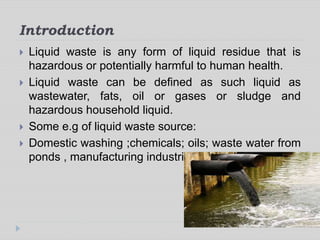The Greatest Guide To Reclaim Waste
The Greatest Guide To Reclaim Waste
Blog Article
Reclaim Waste for Beginners
Table of ContentsThe Only Guide for Reclaim WasteUnknown Facts About Reclaim WasteReclaim Waste for BeginnersThe Main Principles Of Reclaim Waste Fascination About Reclaim Waste
Explore the types, events, and kinds of liquid waste. Domestic sewage waste refers to the waste and products from a property sewage-disposal tank. This kind of waste is developed by human beings in houses, schools, and various other buildings. This only includes sewage-disposal tanks that have a drain field. The appropriate monitoring and disposal of domestic sewage waste require liquid waste to be transferred to a sewer treatment plant where the proper methods and equipment are related to detoxify and dispose of waste.
Commercial waste usually includes potential dangers, such as flammable products or a mix of fluid and strong waste items, and needs an advanced and in-depth disposal process. The disposal of business waste typically includes the filtration of waste prior to transport to make certain risk-free and appropriate disposal. Hazardous waste is developed from results and runoff of industrial procedures and manufacturing.
This sort of waste can not utilize the same sewer monitoring transportation or procedures as septic or commercial liquids. The commercial waste administration procedure requires the examination and screening of liquid waste prior to it undertakes the disposal process (liquid waste removal melbourne). Overflow waste is the liquid waste that comes from runoff and excess stormwater in very booming locations or cities
Runoff waste can cause contamination and flooding if not managed correctly. Discover more concerning drain cleansing and waste monitoring. Guaranteeing proper waste administration can avoid disasters and minimize environmental harm. Both individuals in residential setups and experts in business or manufacturing industries can gain from understanding the procedures and regulations of fluid waste management.
Everything about Reclaim Waste
Contact PROS Providers today to discover our waste administration and disposal solutions and the correct means to take care of the fluid waste you create.
(https://moz.com/community/q/user/reclaimwaste1)Do you know what happens to your water when you disengage, purge the commode or drain the washing device? No? Well, it's worth recognizing. This so-called 'wastewater' is not just an essential source but, after treatment, will be launched to our land, waterways or the ocean. Utilized water from bathrooms, showers, baths, kitchen area sinks, washings and commercial procedures is called wastewater.

water used to cool down equipment or clean plant and equipment). Stormwater, a form of wastewater, is overflow that streams from agricultural and city locations such as roofs, parks, yards, roadways, paths and gutters into stormwater drains, after rainfall. Stormwater flows unattended directly to regional creeks or rivers, ultimately getting to the sea.
Some Known Factual Statements About Reclaim Waste
In Queensland, many wastewater is dealt with at sewer treatment plants. Wastewater is delivered from domestic or commercial sites through a system of sewage systems and pump stations, known as sewage reticulation, to a sewer therapy plant. Regional federal governments build, maintain and run most sewage therapy plants. Operators are licensed under the Environmental Security Act 1994 to discharge treated wastewater at an acceptable environmental criterion into waterways.
The Department of Natural Resources advises regional federal governments about managing, operating and preserving sewage systems and treatment plants. In unsewered locations, neighborhood federal governments might need householders to install individual or home sewer treatment systems to deal with residential wastewater from toilets, cooking areas, restrooms and washings. The Department of Natural Resources authorises making use of house systems when they are shown to be effective.
Many stormwater gets no treatment. In some new communities, treatment of some stormwater to get rid of litter, sand and crushed rock has actually started using gross toxin catches. Wastewater treatment happens in four stages: Gets rid of solid matter. Bigger solids, such as plastics and various other things wrongly discharged to sewage systems, are eliminated when wastewater is travelled through screens.
Wastewater then flows right into big tanks where solids resolve and are eliminated as sludge. Grease and scum are skimmed from the surface. Uses little living organisms referred to as micro-organisms to damage down and get rid of remaining dissolved wastes and fine bits. Micro-organisms and wastes are included in the sludge. Removes nitrogen and phosphorus nutrients that could trigger algal blossoms in our waterways and intimidate marine life.
The 9-Minute Rule for Reclaim Waste
Nutrient removal is not available in any way sewer therapy plants since it requires costly specialist devices. It is coming to be a lot more common in Queensland. Clear fluid effluent produced after therapy may still have disease-causing micro-organisms. If this effluent is released into waterways such as rivers or the sea, the micro-organisms will eventually pass away out.

A lot of wastewater flows into the sewage system. Under the Act, regional governments administer approvals and licences for environmentally relevant activities (Ages) including wastewater releases that may have a neighborhood impact.
The Of Reclaim Waste
Surveillance supplies valid details concerning water high quality and can validate that licence conditions are being fulfilled. The info obtained through monitoring offers the basis for making water high quality decisions.
Report this page